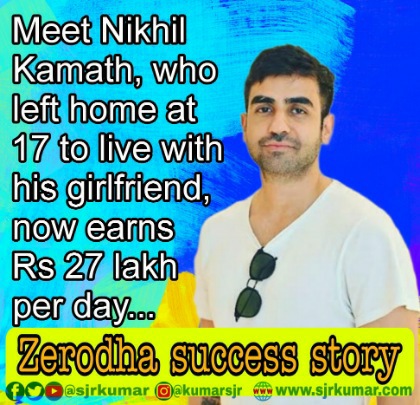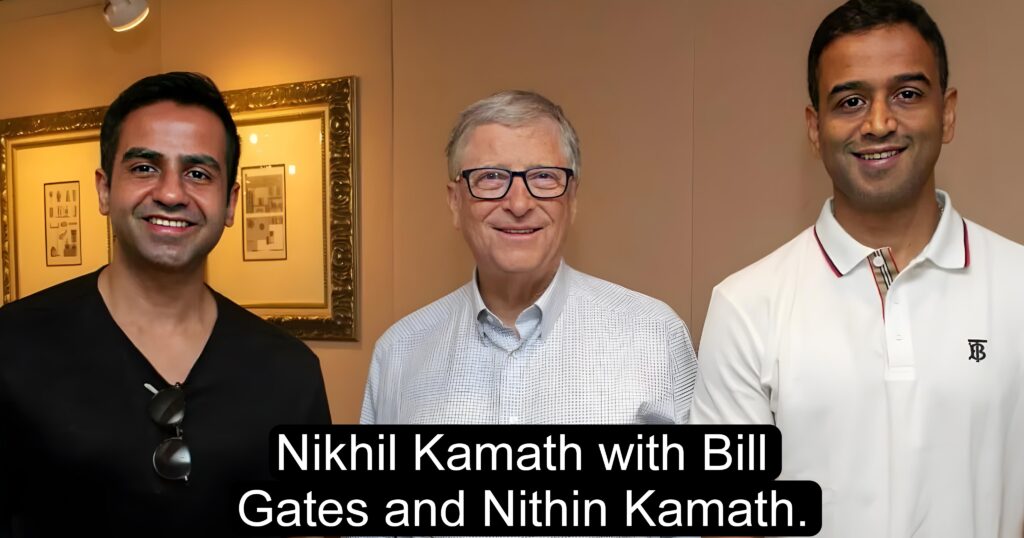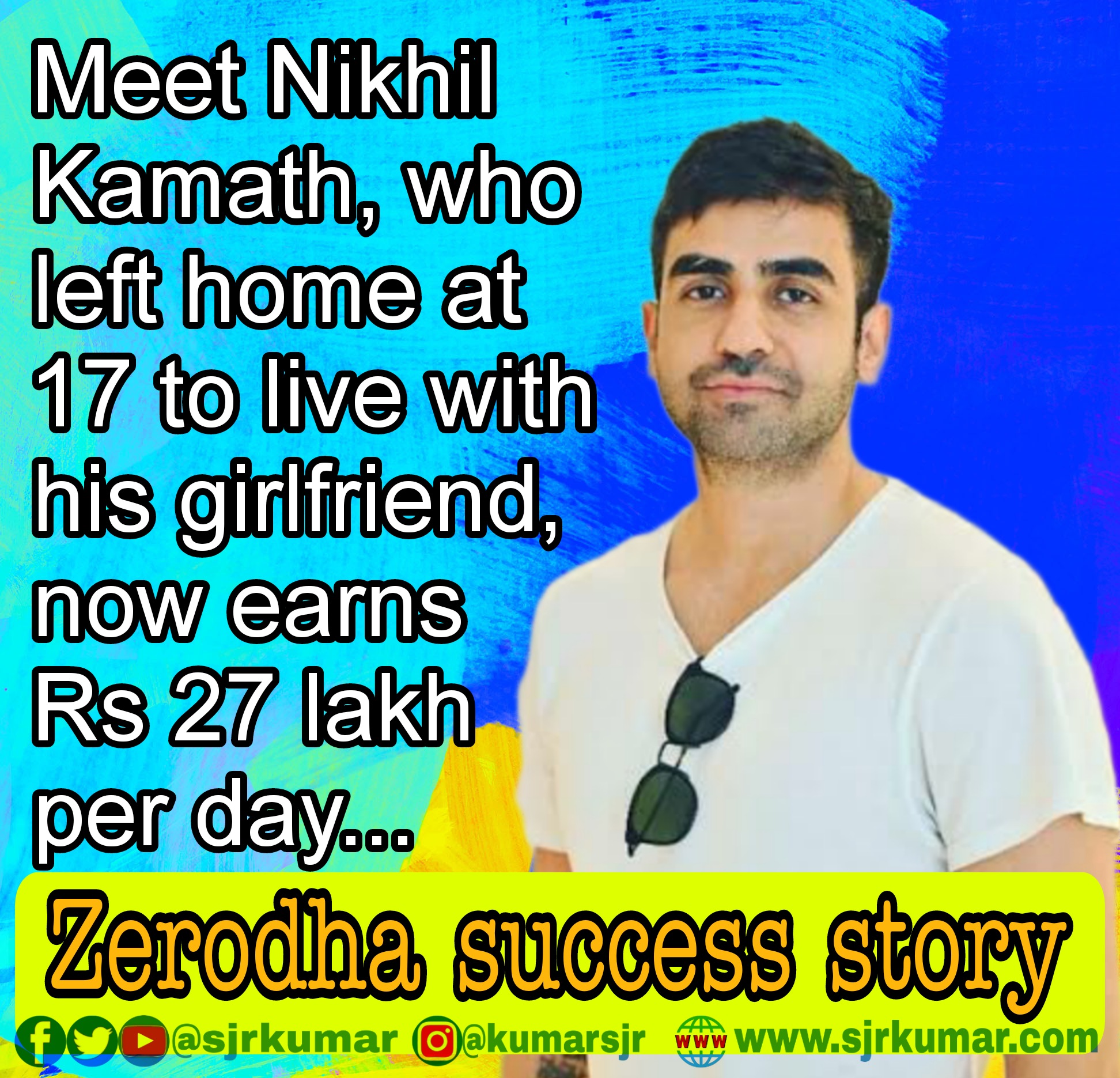Meet Nikhil Kamath, who left home at 17 to live with his girlfriend, now earns Rs 27 lakh per day…
Last year, he made it to the top of the Hurun Self-Made Rich List 2022.

The story of Nithin Kamath and Nikhil Kamath is unique. They proved that college degrees are not a prerequisite to success. The brothers developed and nurtured a Fintech company, Zerodha, that made a profit of over Rs 2,000 crore this year. This, at a time when startups are increasingly finding burn rates fashionable. The company is mostly bootstrapped. The brothers tried to secure funding but were denied in the absence of a formal education. But they made up for the lack of former education with natural talent, originality in ideas, hunger to learn the trade and pure hard work.
Nikhil Kamath is the younger of the two. Last year, he made it to the top of the Hurun Self-Made Rich List 2022. At that time, his net worth was a whopping Rs 17,500 crore. He became a billionaire in 2021 when he was just 34. He has led an interesting life. He hated school as a child. He found school education inhibiting.
He showed early promise. At the age of 14, he started selling used phones. His mother, upset with the business, flushed down all the phones in the toilet. The school management was also upset with his lack of appreciation for formal education. They were denying him the chance to appear for the Class 10 board exams. Kamath dropped out of school.
At the age of 17, he secured a job at a call centre at a paltry salary of Rs 8000. He faked his birth certificate over it. He then moved out of his parents’ home and started living with his girlfriend.
“I moved out then–I had a girlfriend and lived with her. I worked from 4 PM to 1 AM at the call center, and in the mornings, I tried my hand at trading. I learnt a lot; when you move away from the family ecosystem and the judgement of relatives, you get down to the real stuff,” he told Humans of Bombay.
However, his father always had faith in him. He gave him his savings to manage. He later convinced his call centre employees to do the same. He said he never worked but the employees used to mark him present as he was managing their money.
In 2010, they launched Zerodha.
He said being a billionaire hasn’t changed one fact about him — he still spends 85 percent of his time working.
Zerodha is a trading application whose USP is that it charges very less money as fee. It earned a profit of Rs 2094 crore. The company has no employees from IIT or IIM. Nithin Kamath had explained why. He said people with prestigious degrees prioritise career growth over what’s best for the company. The company also has a very small attrition rate. The company has at least 1 crore users.
Nithin Kamath and Nikhil Kamath reportedly earn a salary package of Rs 100 crore each. This includes a base salary of Rs 4.16 crore, Rs 2 crore for housing rent, Rs 1.6 crore for other perks and Rs 41 lakh for extra allowances.

Zerodha is derived from the Sanskrit word Rodha which means Obstructions. The name Zerodha means ‘No Obstructions’. Hence, the founder aimed at providing a hassle-free, low brokerage trading platform. He targeted clients who are young and more tech-savvy to contribute to the capital market ecosystem.
According to him, he wanted more of a Google-like platform with simple to use rather than a Yahoo-like platform. When he felt the need to change the system, he along with his younger brother, Nikhil, started Zerodha and the rest is the history or rather a case study for everyone.
The Secret Formula of Zerodha’s Success…
It is indeed a fact that there is no shortcut to success. However, Nithin Kamath, when founded this discount broking firm, decided to provide technology-efficient and cost-efficient services to its customers. He observed that there is a huge lag between the commissions charged by the other brokerage firms and the amount of money actually received by the customers.
In addition to that, the technology that was used was too old and Nithin felt the need to introduce a smart platform that enables users to trade online comfortably. He thought of providing services at a low cost where the idea of charging low commission clicked into his mind.
He also wanted to attract more young customers who often do not enter into trading due to high commission charges. With this aim, he started his firm and today it has become the biggest discount broking firm. He believes if we do not depend too much on foreign capital and invest in our own companies, the day is not far when India will become an economically strong country.

Surprisingly, the firm hardly spent any money on advertising or marketing for its own firm. They do not run any advertisements. The founder believes in ‘the word of mouth is your true marketing’. Thus, with a very low operating cost Zerodha was able to capture a large number of customers.
Interestingly, trading is provided free of cost at his stockbroking firm if the period of holding for shares is longer than a day. They make money by charging a flat fee of Rs. 20 for futures, options, and intraday trading.
While other competitors charge much more than this which is based on the percentage of a transaction traded. Its business model on which it works is ‘low margin – high volume’.
In order to stay competitive, the firm launched many products to expand its reach and to overcome some challenges they were facing.
Below is a brief on what each product provides:
— Console: It is a central dashboard of a customer’s account with Zerodha that will provide in-depth reports and visualizations to get more insightful ideas.
— Kite: It is a sleek trading and investment platform using the latest technologies. It eases the customer’s experience to trade and transact in the stock market.
— Kite Connect API: This is mainly focused on independent traders and startups to enable them to build an innovative trading and investment platform. Using algorithms, retail traders can automate their trades.
— Sentinel: A platform that enables you to create market alerts. The alerts can be customized based on price, trade quantity, and open interest. The interesting aspect of this product is that you do not need to be a Zerodha customer in order to use Sentinel.
— Z Connect: This is a blog facility regarding stocks, trading, and investment with Zerodha. They publish articles and information on this blog and any user is allowed to ask questions and post comments.
— Varsity: One of the challenges faced by this firm was that it lacked in providing research services to its customers who are sometimes clueless about what and when to buy or sell. To overcome this, they come up with Varsity that gives a vast collection of stock market lessons on the go.
— Coin: It provides a commission-free purchase of mutual funds directly delivered into the customer’s Demat account.
— Rainmatter: It is an incubator that provides funding as well as mentorship to startup companies in capital markets and gives a minority stake in the exchange.
In addition, Zerodha has also partnered with a lot of leading stock market platforms and portals like Streak, Sensibull, etc to create more value for their clients.


